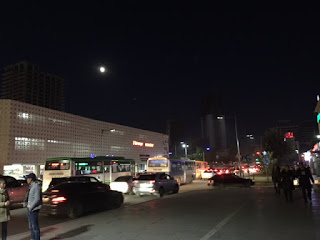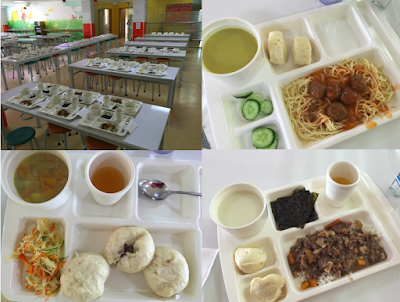 |
| Working towards a full moon... |
After a successful "Sports Day" at my Elementary School this afternoon, I attended a happy hour event with co-workers and then rode the bus home for the first time AFTER dark. I've been afraid to do this.....though I'm not sure why. What is it about Darkness that makes us fearful? Some have their musings on the topic and I can't disagree. I ride the same bus as in daylight and travel the same route. The bus is fully lit, as I learned tonight. It was, as normal, populated with single men and women, couples (young and old), and people with children. At 8 PM it was actually fairly empty (ie NOT standing room only). I listened to my iPod on the ride home (LOVE Rob Thomas' new album and specifically, The Great Unknown and Paper Dolls), as I often do, and watched the people and traffic.
 |
| View from my Library. Notice both gers and high rises! |
I AM alone here in this foreign land. That is not lost on me in some moments. And I don't mean ALONE as in "without anyone." I have a man that loves and cares for me. I have a (step)son that has allowed me to become his family. And a family of in-laws that has welcomed me fully and completely. I also have a professional community populated with Americans and Canadians, among others. And a select and small group of us "American wives" of Mongol men (update: our marriage application was officially submitted this week to the Office of Civil Registration and is in progress). BUT....I am alone in Asia with no one from my past. No one that knew me when. That knows the distance I've traveled, emotionally, to be here. That knows my childhood stories, my family history. It feels a bit like a re-booted life......
There is a freedom that comes with leaving all of one's history in a place far away. I could and can be whomever I want. Reinvent, recreate, reimagine myself.
Ah....but, I like who I am and the road I've traveled holds nothing but memories and people that made me who I am. I wouldn't abandon or disown those treads. While I may have chosen paths that dead-ended, they were my paths to walk and my paths to back-track out of. I make no apologies for my choices. I have never harmed anyone intentionally and have acted in good faith. Free will is a beautiful and weighty thing; it requires respect and responsibility. And we do ourselves a great disservice when we forget that we have it. This last year has taught me how to answer the question: "If today is my last day on Earth, did I spend it well?"
 |
| My new addiction! |
But this culture is no scarier than my home one. We are all just people....trying to make a connection....trying to feel at home, no matter where we are in the world.
So I begin to push beyond my comfort boundaries and into the darkness, doing my best to shed light on the shadows.










